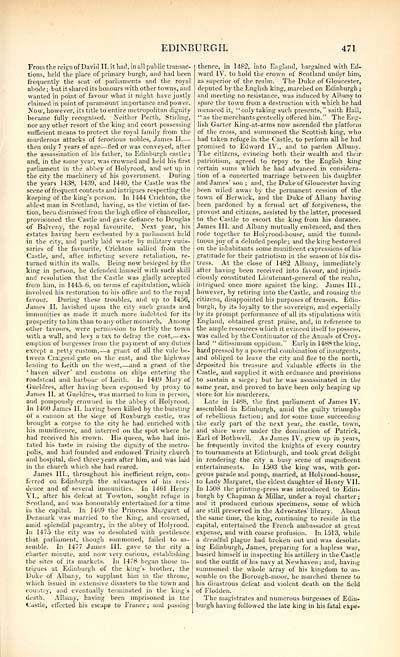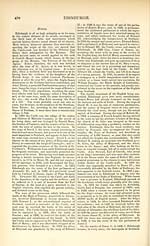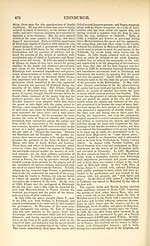Topographical, statistical, and historical gazetteer of Scotland > Volume 1
(563) Page 471
Download files
Complete book:
Individual page:
Thumbnail gallery: Grid view | List view

EDINBURGH.
471
From the reign of David II. it Lad, in all public transac-
tions, held the place of primary burgh, and had been
frequently the seat of parliaments and the royal
abode ; but it shared its honours with other towns, and
wanted in point of favour what it might have justly
claimed in point of paramount importance and power.
Now, however, its title to entire metropolitan dignity
became fully recognised. Neither Perth, Stirling,
nor any other resort of the king and court possessing
sufficient means to protect the royal family from the
murderous attacks of ferocious nobles, James II. —
then only 7 years of age — fled or was conveyed, after
the assassination of his father, to Edinburgh castle ;
and, in the same year, was crowned and held his first
parliament in the abbey of Holyrood, and set up in
the city the machinery of his government. During
the years 1438, 1439, and 1440, the Castle was the
scene of frequent contests and intrigues respecting the
keeping of the king's person. In 1444 Crichton, the
ablest man in Scotland, having, as the victim of fac-
tion, been dismissed from the high office of chancellor,
provisioned the Castle and gave defiance to Douglas
of Balveny, the royal favourite. Next year, his
estates having been escheated by a parliament held
in the city, and partly laid waste by miUtary emis-
saries of the favourite, Crichton salbed from the
Castle, and, after inflicting severe retaliation, re-
turned within its walls. Being now besieged by the
king in person, he defended himself with such skill
and resolution that the Castle was gladly accepted
from him, in 1445-6, on terms of capitulation, which
involved his restoration to his office and to the royal
favour. During these troubles, and up to 145b',
James II. lavished upon the city such grants and
immunities as made it much more indebted for its
prosperity to him than to any other monarch. Among
other favours, were permission to fortify the town
with a wall, and levy a tax to defray the cost, — ex-
emption of burgesses from the payment of any duties
except a petty custom, — a grant of all the vale be-
tween Craigend gate on the east, and the highway
leading to Leith on the west, — and a grant of the
* haven silver' and customs on ships entering the
roadstead and harbour of Leith. In 1449 Mary of
Gueldres, after having been espoused by proxy to
James II. at Gueldres, was married to him in person,
and pompously crowned in the abbey of Holyrood.
In 1460 James II. having been killed by the bursting
of a cannon at the siege of Roxburgh castle, was
brought a corpse to the city he had enriched with
his munificence, and interred on the spot where he
had received his crown. His queen, who had imi-
tated his taste in raising the dignity of the metro-
polis, and had founded and endowed Trinity church
and hospital, died three years after him, and was laid
in the church which she had reared.
James III., throughout his inefficient reign, con-
ferred on Edinburgh the advantages of his resi-
dence and of several immunities. In 1461 Henry
VI., after his defeat at Towton, sought refuge in
Scotland, and was honourably entertained for a time
in the capital. In 1469 the Princess Margaret of
Denmark was married to the King, and crowned,
amid splendid pageantry, in the abbey of Holyrood.
In 1475 the city was so desolated with pestilence
that parliament, though summoned, failed to as-
semble. In 1477 James III. gave to the city a
charter minute, and now very curious, establishing
the sites of its markets. In 1478 began those in-
trigues at Edinburgh of the king's brother, the
Duke of Albany, to supplant him in the throne,
which issued in extensive disasters to the town and
country, and eventually terminated in the king's
death. Albany, having been imprisoned in the
Castle, effected his escape to France ; and passing
thence, in 1482, into England, bargained with Ed-
ward IV. to hold the crown of Scotland under him,
as superior of the realm. The Duke of Gloucester,
deputed by the English king, marched on Edinburgh ;
and meeting no resistance, was induced by Albany to
spare the town from a destruction with which he had
menaced it, "only taking such presents," saith Hall,
" as the merchants genteelly offered him." The Eng-
lish Garter King-at-arms now ascended the platform
of the cross, and summoned the Scottish king, who
had taken refuge in the Castle, to perform all he had
promised to Edward IV., and to pardon Albany.
The citizens, evincing both their wealth and their
patriotism, agreed to repay to the English king
certain sums which he had advanced in considera-
tion of a concerted marriage between his daughter
and James' son ; and, the Duke of Gloucester having
been wiled away by the permanent cession of the
town of Berwick, and the Duke of Albany having
been pardoned by a formal act of forgiveness, the
provost and citizens, assisted by the latter, processed
to the Castle to escort the king from his durance.
James III. and Albany mutually embraced, and then
rode together to Holyrood-house, amid the tumul-
tuous joy of a deluded people ; and the king bestowed
on the inhabitants some munificent expressions of his
gratitude for their patriotism in the season of his dis-
tress. At the close of 1482 Albany, immediately
after having been received into favour, and injudi-
ciously constituted Lieutenant-general of the realm,
intrigued once more against the king. James III.,
however, by retiring into the Castle, and rousing the
citizens, disappointed his purposes of treason. Edin-
burgh, by its loyalty to the sovereign, and especially
by its prompt performance of all its stipulations with
England, obtained great praise, and, in reference to
the ample resources which it evinced itself to possess,
was called by the Continuator of the Annals of Croy-
land *' ditissimum oppidum." Early in 1488 the king,
hard pressed by a powerful combination of insurgents,
and obliged to leave the city and flee to the north,
deposited his treasure and valuable effects in the
Castle, and supplied it with ordnance and provisions
to sustain a siege ; but he was assassinated in the
same year, and proved to have been only heaping up
store for his murderers.
Late in 1488, the first parliament of James IV.
assembled in Edinburgh, amid the guilty triumphs
of rebellious faction; and for some time succeeding
the early part of the next year, the castle, town,
and shire were under the domination of Patrick,
Earl of Bothwell. As James IV. grew up in years,
he frequently invited the knights of every country
to tournaments at Edinburgh, and took great delight
in rendering the city a busy scene of magnificent
entertainments. In 1503 the king was, with gor-
geous parade and pomp, married, at Holyrood-house,
to Lady Margaret, the eldest daughter of Henry VII.
In 1508 the printing-press was introduced to Edin-
burgh by Chapman & Millar, under a royal charter ;
and it produced curious specimens, some of which
are still preserved in the Advocates' library. About
the same time, the king, continuing to reside in the
capital, entertained the French ambassador at great
expense, and with coarse profusion. In 1513, while
a dreadful plague had broken out and was desolat-
ing Edinburgh, James, preparing for a hapless war,
busied himself in inspecting his artillery in the Castle
and the outfit of his navy at Newhaven ; and, having
summoned the whole array of his kingdom to as-
semble on the Borough-moor, he marched thence to
his disastrous defeat and violent death on the field
of Flodden.
The magistrates and numerous burgesses of Edin-
burgh having followed the late king in his fatal expe-
471
From the reign of David II. it Lad, in all public transac-
tions, held the place of primary burgh, and had been
frequently the seat of parliaments and the royal
abode ; but it shared its honours with other towns, and
wanted in point of favour what it might have justly
claimed in point of paramount importance and power.
Now, however, its title to entire metropolitan dignity
became fully recognised. Neither Perth, Stirling,
nor any other resort of the king and court possessing
sufficient means to protect the royal family from the
murderous attacks of ferocious nobles, James II. —
then only 7 years of age — fled or was conveyed, after
the assassination of his father, to Edinburgh castle ;
and, in the same year, was crowned and held his first
parliament in the abbey of Holyrood, and set up in
the city the machinery of his government. During
the years 1438, 1439, and 1440, the Castle was the
scene of frequent contests and intrigues respecting the
keeping of the king's person. In 1444 Crichton, the
ablest man in Scotland, having, as the victim of fac-
tion, been dismissed from the high office of chancellor,
provisioned the Castle and gave defiance to Douglas
of Balveny, the royal favourite. Next year, his
estates having been escheated by a parliament held
in the city, and partly laid waste by miUtary emis-
saries of the favourite, Crichton salbed from the
Castle, and, after inflicting severe retaliation, re-
turned within its walls. Being now besieged by the
king in person, he defended himself with such skill
and resolution that the Castle was gladly accepted
from him, in 1445-6, on terms of capitulation, which
involved his restoration to his office and to the royal
favour. During these troubles, and up to 145b',
James II. lavished upon the city such grants and
immunities as made it much more indebted for its
prosperity to him than to any other monarch. Among
other favours, were permission to fortify the town
with a wall, and levy a tax to defray the cost, — ex-
emption of burgesses from the payment of any duties
except a petty custom, — a grant of all the vale be-
tween Craigend gate on the east, and the highway
leading to Leith on the west, — and a grant of the
* haven silver' and customs on ships entering the
roadstead and harbour of Leith. In 1449 Mary of
Gueldres, after having been espoused by proxy to
James II. at Gueldres, was married to him in person,
and pompously crowned in the abbey of Holyrood.
In 1460 James II. having been killed by the bursting
of a cannon at the siege of Roxburgh castle, was
brought a corpse to the city he had enriched with
his munificence, and interred on the spot where he
had received his crown. His queen, who had imi-
tated his taste in raising the dignity of the metro-
polis, and had founded and endowed Trinity church
and hospital, died three years after him, and was laid
in the church which she had reared.
James III., throughout his inefficient reign, con-
ferred on Edinburgh the advantages of his resi-
dence and of several immunities. In 1461 Henry
VI., after his defeat at Towton, sought refuge in
Scotland, and was honourably entertained for a time
in the capital. In 1469 the Princess Margaret of
Denmark was married to the King, and crowned,
amid splendid pageantry, in the abbey of Holyrood.
In 1475 the city was so desolated with pestilence
that parliament, though summoned, failed to as-
semble. In 1477 James III. gave to the city a
charter minute, and now very curious, establishing
the sites of its markets. In 1478 began those in-
trigues at Edinburgh of the king's brother, the
Duke of Albany, to supplant him in the throne,
which issued in extensive disasters to the town and
country, and eventually terminated in the king's
death. Albany, having been imprisoned in the
Castle, effected his escape to France ; and passing
thence, in 1482, into England, bargained with Ed-
ward IV. to hold the crown of Scotland under him,
as superior of the realm. The Duke of Gloucester,
deputed by the English king, marched on Edinburgh ;
and meeting no resistance, was induced by Albany to
spare the town from a destruction with which he had
menaced it, "only taking such presents," saith Hall,
" as the merchants genteelly offered him." The Eng-
lish Garter King-at-arms now ascended the platform
of the cross, and summoned the Scottish king, who
had taken refuge in the Castle, to perform all he had
promised to Edward IV., and to pardon Albany.
The citizens, evincing both their wealth and their
patriotism, agreed to repay to the English king
certain sums which he had advanced in considera-
tion of a concerted marriage between his daughter
and James' son ; and, the Duke of Gloucester having
been wiled away by the permanent cession of the
town of Berwick, and the Duke of Albany having
been pardoned by a formal act of forgiveness, the
provost and citizens, assisted by the latter, processed
to the Castle to escort the king from his durance.
James III. and Albany mutually embraced, and then
rode together to Holyrood-house, amid the tumul-
tuous joy of a deluded people ; and the king bestowed
on the inhabitants some munificent expressions of his
gratitude for their patriotism in the season of his dis-
tress. At the close of 1482 Albany, immediately
after having been received into favour, and injudi-
ciously constituted Lieutenant-general of the realm,
intrigued once more against the king. James III.,
however, by retiring into the Castle, and rousing the
citizens, disappointed his purposes of treason. Edin-
burgh, by its loyalty to the sovereign, and especially
by its prompt performance of all its stipulations with
England, obtained great praise, and, in reference to
the ample resources which it evinced itself to possess,
was called by the Continuator of the Annals of Croy-
land *' ditissimum oppidum." Early in 1488 the king,
hard pressed by a powerful combination of insurgents,
and obliged to leave the city and flee to the north,
deposited his treasure and valuable effects in the
Castle, and supplied it with ordnance and provisions
to sustain a siege ; but he was assassinated in the
same year, and proved to have been only heaping up
store for his murderers.
Late in 1488, the first parliament of James IV.
assembled in Edinburgh, amid the guilty triumphs
of rebellious faction; and for some time succeeding
the early part of the next year, the castle, town,
and shire were under the domination of Patrick,
Earl of Bothwell. As James IV. grew up in years,
he frequently invited the knights of every country
to tournaments at Edinburgh, and took great delight
in rendering the city a busy scene of magnificent
entertainments. In 1503 the king was, with gor-
geous parade and pomp, married, at Holyrood-house,
to Lady Margaret, the eldest daughter of Henry VII.
In 1508 the printing-press was introduced to Edin-
burgh by Chapman & Millar, under a royal charter ;
and it produced curious specimens, some of which
are still preserved in the Advocates' library. About
the same time, the king, continuing to reside in the
capital, entertained the French ambassador at great
expense, and with coarse profusion. In 1513, while
a dreadful plague had broken out and was desolat-
ing Edinburgh, James, preparing for a hapless war,
busied himself in inspecting his artillery in the Castle
and the outfit of his navy at Newhaven ; and, having
summoned the whole array of his kingdom to as-
semble on the Borough-moor, he marched thence to
his disastrous defeat and violent death on the field
of Flodden.
The magistrates and numerous burgesses of Edin-
burgh having followed the late king in his fatal expe-
Set display mode to: Large image | Transcription
Images and transcriptions on this page, including medium image downloads, may be used under the Creative Commons Attribution 4.0 International Licence unless otherwise stated. ![]()
| Gazetteers of Scotland, 1803-1901 > Topographical, statistical, and historical gazetteer of Scotland > Volume 1 > (563) Page 471 |
|---|
| Permanent URL | https://digital.nls.uk/97444302 |
|---|
| Description | Volume first. A-H. |
|---|---|
| Attribution and copyright: |
|

